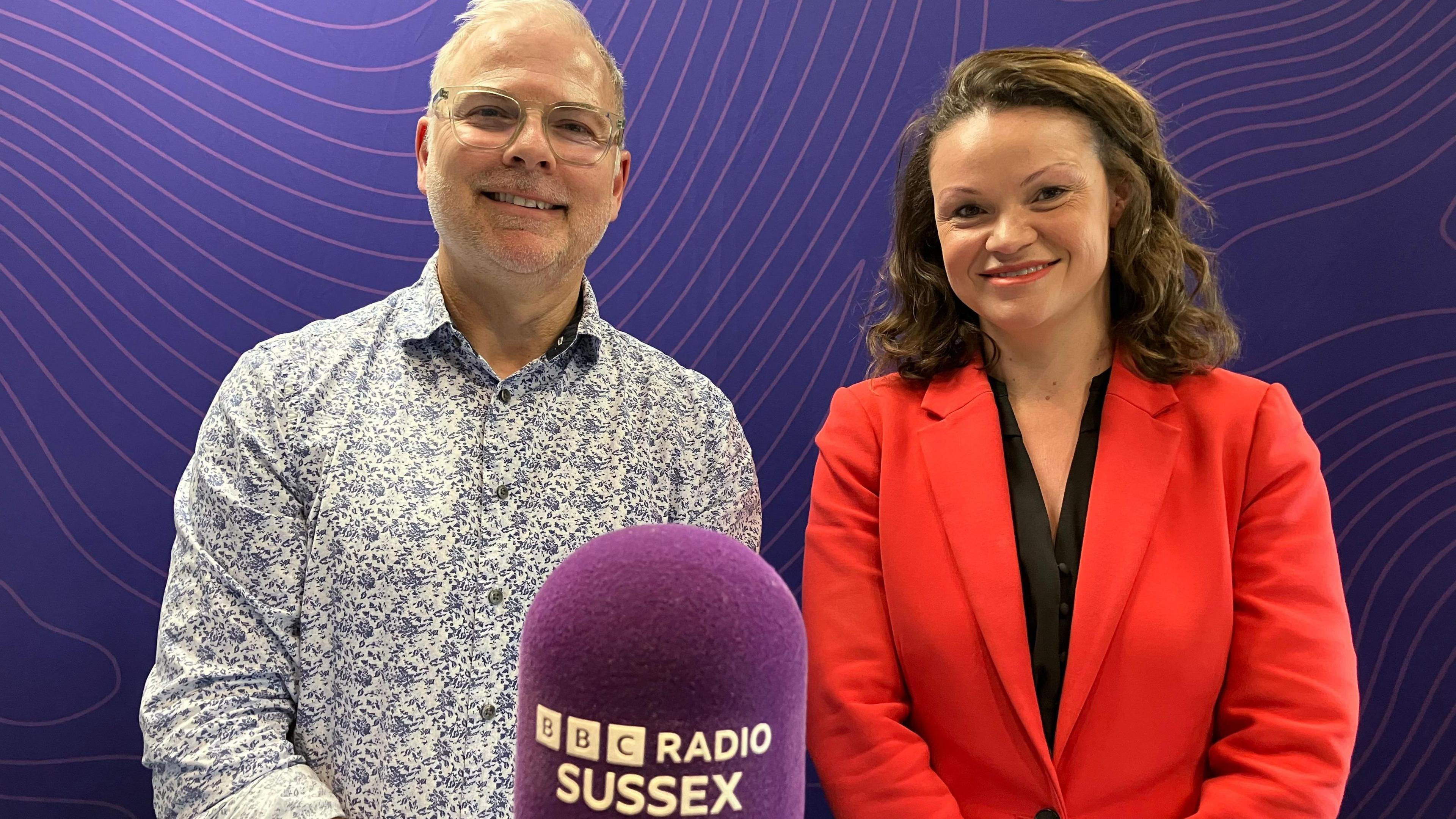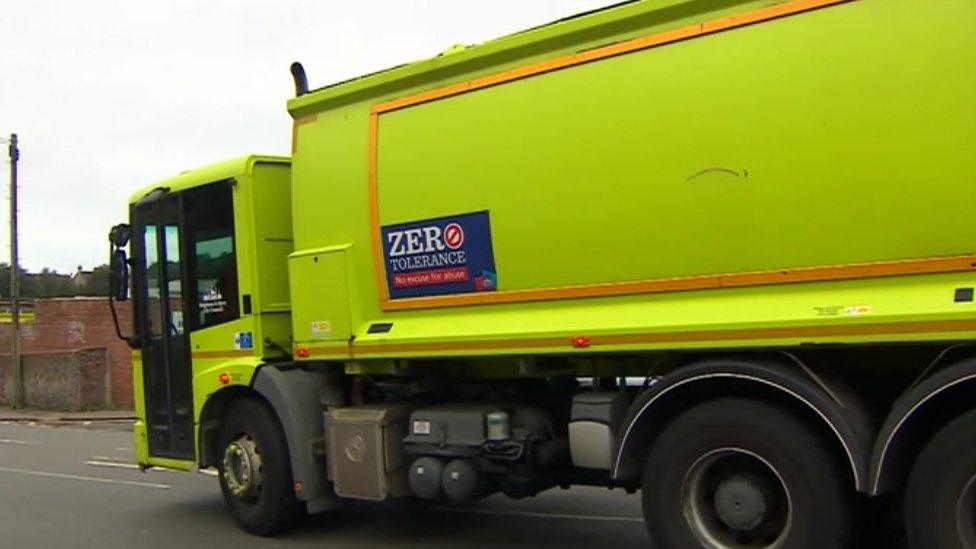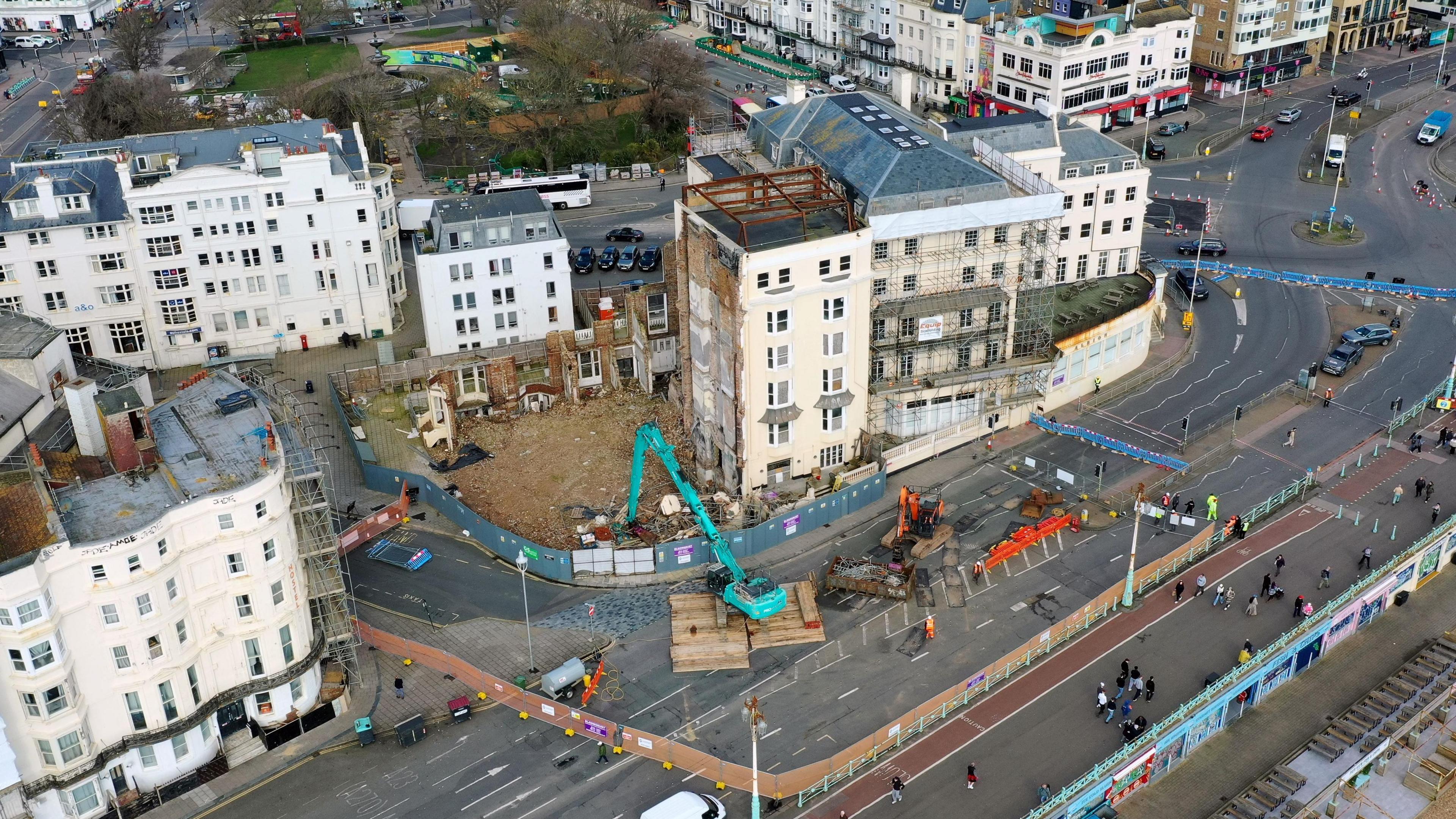Five takeaways from council leader in hotseat

Bella Sankey joined BBC Radio Sussex presenter Danny Pike to answer listener's questions
- Published
Brighton & Hove City Council leader Bella Sankey has been in the hotseat on BBC Radio Sussex.
After being elected in December 2022, Ms Sankey took on the leadership of the council just six months later after Labour won control in a historic victory.
She has a background as a lawyer and human rights campaigner, including working to criminalise modern day slavery and support asylum seekers.
In a wide-ranging interview, she spoke about her pride that her father helped to build the maternity unit at the Royal Sussex County Hospital and that she and her two children had all been born there.
Here are five takeaways from what she had to say…
1. Bin collections
Council figures show a 140% rise in missed bin collection in the city in the past six months.
In 2023, an independent report found a toxic culture mired in racism, sexism, homophobia and threatening behaviour at Brighton and Hove's waste management service, formerly known as Cityclean, including an alleged death threat.
Ms Sankey said while there had been "massive improvements" in service reliability, she apologised for recent setbacks.
She said toxic behaviours had prevented adequate investment in bin lorries, and while other services around the country had moved to digital services, Brighton and Hove was still operating a paper system.
"There are still some incredibly bad behaviours, criminal behaviours, being undertaken by a very small group of individuals. It's absolutely despicable," she said.
"We are working with the police. We will not be held to ransom anymore in the city."
Weekly collections of food waste, which make up a third of household waste, are to start in the city in the autumn.
2. Housing conditions
Social housing in the city has been criticised for serious failings in fire safety and a huge backlog of repairs.
In 10 blocks of flats, fire chiefs have insisted on a 24-hour 'walking watch' to keep residents safe.
Ms Sankey admitted it was "unacceptable" that the city's housing stock had got into such a poor state, but that historic tower blocks built in the 1950s and 1960s were posing a challenge to meet current regulations.
She said the council was "absolutely committed to being the best possible social housing landlord we can be" and was investing millions in remediation work and considering complete redevelopment and refurbishment in some cases.
She said: "There's a whole series of measure now that we are undertaking to ensure that we improve safety, that we get on top of repairs.
"When things go this badly wrong, I think it's really important to get to the root cause of why it's gone wrong and ensure that it can't happen again in the future."
3. The i360 deal
After Brighton's i360 viewing tower went into administration, the council agreed to write off £51m of debt to facilitate the attraction being sold to hospitality company Nightcap for £150,000.
Ms Sankey said it was "the best thing to do in a really difficult set of circumstances", because the attraction was "destined to fail" under the old model.
"Business rates can now come back to the council, ensuring people are going to that area of the seafront for the other traders there and the poor staff that lost their jobs when the i360 went bust, many of them have now been reemployed."
She said the council had not granted a 75% discount in business rates requested by the new owners and had negotiated a 1% share of revenue from ticket sales to be shared with the council.
4. Royal Albion Hotel demolition costs
Since a fire destroyed the 200-year-old Royal Albion Hotel on Brighton seafront in July 2023, the council has spent £1.2m on safety and demolition work at the site.
Ms Sankey said because the council had "ultimate responsibility" for the safety of residents, it needed to "come in almost like an emergency service" to ensure the building was made safe.
Its owners, Britannia Hotels, have so far paid back £500,000 to the council.
Ms Sankey said: "You invoice in stages. We've invoiced for the first bit, we will then invoice for the rest and we will get that money back."
She said court proceedings were not being considered.
5. 'I won't be mayor'
Ms Sankey said plans for devolution, including elected mayor and a complete reorganisation of local councils, would see "central government giving more power and money to regions".
Asked whether devolution would suit Sussex with its mix of a city, towns and villages in rural and coastal areas, she said Greater Manchester – a city surrounded by towns that has had a mayor since 2015 – was "not dissimilar".
She proposed creating five new unitary authorities, each serving 300,000 to 500,000 people, which goes against the government recommendation of populations of at least half a million.
She said: "We run a unitary authority, we provide 700 services. I think there is an optimum amount of people to provide those services to, so you make sure that you're doing a good job.
"Having unitary authorities that are quite tied to place and communities, coastal authorities and more rural ones, I think will allow the different identities we have in Sussex to be expressed."
Asked if she would be standing for election as the first mayor of Sussex, she said: "That's not something that I am going for or interested in.
"I'm delivering for our city and I'm going to carry on doing that."
Follow BBC Sussex on Facebook, external, X, external, and Instagram, external. Send your story ideas to southeasttoday@bbc.co.uk, or WhatsApp us on 08081 002250.
- Published15 May

- Published14 November 2023

- Published28 February
